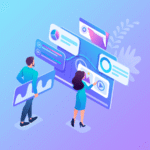- May 25, 2025
- by digitaldealway
- Uncategorized
- 0 Comments
Introduction

In today’s digital age, software engineering is one of the most in-demand and high-paying careers. From designing websites and developing mobile apps to building AI systems and enterprise software, software engineers are at the heart of modern innovation. Whether you’re a student, a career switcher, or simply curious, this guide will walk you through everything you need to know about how to become a software engineer—even without a traditional computer science degree.
What Does a Software Engineer Do?
Before diving into the steps, it’s important to understand what software engineers actually do. Software engineers apply engineering principles to the design, development, testing, and maintenance of software systems.
Key Responsibilities:
- Writing clean and efficient code
- Designing software architecture
- Debugging and testing programs
- Collaborating with developers, designers, and product teams
- Maintaining and improving existing software
Step 1: Choose Your Software Engineering Path
Software engineering has several specializations. Choosing a path helps focus your learning and career goals.
Popular Software Engineering Roles:
- Front-end Developer (UI/UX and website design)
- Back-end Developer (server-side development and databases)
- Full-stack Developer (front-end + back-end)
- Mobile App Developer (iOS/Android)
- DevOps Engineer
- Machine Learning Engineer
- Game Developer
Start by exploring these paths and identifying which aligns with your interests and goals.
Step 2: Get the Right Education
You don’t always need a formal degree to become a software engineer, but having a solid education helps.
Education Options:
- Bachelor’s Degree in Computer Science or Software Engineering
- Online Courses and Bootcamps (Udemy, Coursera, Codecademy, freeCodeCamp)
- Self-Taught Routes via books, tutorials, and open-source projects
Some employers require a degree, but many tech companies focus more on skills, portfolios, and practical experience.
Step 3: Learn the Core Programming Languages
Mastering the right programming languages is essential. Start with beginner-friendly languages and progress based on your specialization.
Common Programming Languages:
- Python – Ideal for beginners, web development, and AI
- JavaScript – Key for front-end and full-stack
- Java – Popular for Android development
- C++/C# – Used in game development and system programming
- SQL – Essential for database management
Focus on problem-solving and logic rather than just syntax.
Step 4: Build Hands-On Projects
Employers love real-world experience. Create your own projects or contribute to open-source software.
Project Ideas:
- Portfolio website
- Blog platform or CMS
- To-do list or productivity app
- Chat application
- E-commerce store clone
Upload your projects on GitHub to showcase your work and improve collaboration skills.
Step 5: Master Data Structures and Algorithms
To succeed in interviews and technical problem-solving, you must understand data structures and algorithms.
Topics to Learn:
- Arrays, Linked Lists, Trees, Graphs
- Sorting and Searching Algorithms
- Recursion
- Dynamic Programming
- Time and Space Complexity
Platforms like LeetCode, HackerRank, and Codeforces are excellent for practice.
Step 6: Understand Version Control and Tools
Learning Git and GitHub is essential for modern software development. They help in tracking code changes and collaborating with others.
Other Useful Tools:
- VS Code or IntelliJ (Code Editors)
- Docker & Kubernetes (for DevOps)
- Postman (API testing)
- JIRA/Trello (project management)
Understanding these tools gives you a competitive edge in job applications.
Step 7: Apply for Internships and Entry-Level Jobs
Start applying once you’re confident with your skills and have built a portfolio.
Where to Find Jobs:
- Indeed
- Stack Overflow Jobs
- Remote OK
- Company career pages
Tailor your resume, write personalized cover letters, and prepare well for coding interviews.
Step 8: Keep Learning and Growing
Technology is always evolving. Successful software engineers continuously learn and adapt.
Ways to Stay Updated:
- Follow tech blogs and YouTube channels
- Read documentation and GitHub repositories
- Attend webinars and coding bootcamps
- Network with professionals on LinkedIn and forums
Internal Links You May Find Useful:
- Best Websites to Learn Coding for Free
- Top GitHub Projects for Beginners
- How to Build a Portfolio Website
- Python vs JavaScript: Which One to Learn First?
Conclusion
Becoming a software engineer is a rewarding journey that combines creativity, logic, and continuous learning. Whether you choose to follow a traditional academic path or a self-taught route, the key is consistency and passion. Start small, build real-world projects, and never stop improving.
By following the steps in this guide, you’ll be well on your way to starting a successful career in software engineering.
FAQs on Becoming a Software Engineer
Q1. Can I become a software engineer without a degree?
Yes! Many top developers are self-taught. Focus on building skills, projects, and a portfolio.
Q2. How long does it take to become a software engineer?
It depends. With full-time dedication, you can become job-ready in 6–12 months through online courses or bootcamps.
Q3. Which is the best programming language to start with?
Python is beginner-friendly and widely used. JavaScript is also great for web development.
Q4. Are software engineers in demand?
Yes. Software engineering is one of the most in-demand careers globally, with excellent job growth and salary potential.



